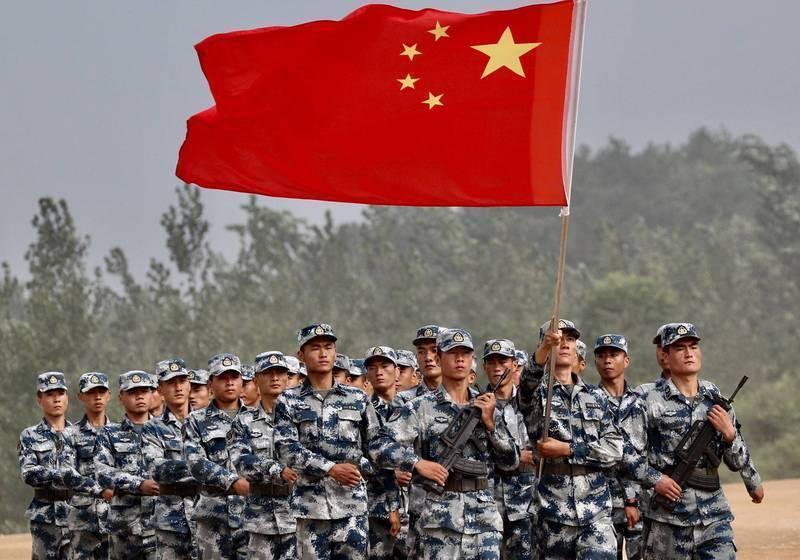Most Taiwanese believe China is unlikely to invade in the coming five years, but do see Beijing as a serious threat, a poll by Taiwan's top military think tank showed today.
Over the past five years or so, China's military has significantly ramped up its activities around Taiwan.

Photo: Reuters
The survey of about 1,200 people conducted last month by the Institute for National Defense and Security Research (INDSR) showed 61 percent of respondents thought it was "unlikely or very unlikely" that China would attack Taiwan in the coming five years.
"Most people do not think China's territorial ambitions will manifest themselves in the form of attacking Taiwan," INDSR researcher Christina Chen said.
Taiwanese are also concerned about other Chinese threats, including military drills and propaganda campaigns, she said.
"Most people see China's territorial ambitions as a serious threat," Chen said.
The poll presents a contrast to a warning by the head of the US’ CIA, who said last year that Chinese President Xi Jinping (習近平) had ordered his military to be ready to conduct an invasion of Taiwan by 2027.
"That means Taiwanese are aware of the threat, but remain calm and rational with the expectations of an imminent war," the INDSR said.
More than 67 percent of respondents to the poll said they would fight back if China attacked, but were split almost evenly on whether Taiwan's armed forces were capable of defending Taiwan, with half expressing confidence and half no confidence.
Lee Kuan-chen (李冠成), another INDSR researcher, said Taiwan's military should continue to boost its defense capabilities to build public trust.
The poll also showed a split in opinion on whether the US would help defend Taiwan.
While about 74 percent believed the US government was likely to "indirectly" help Taiwan by providing food, medical supplies and weapons, only 52 percent thought the US would dispatch its armed forces to intervene, the poll showed.
Lee said Taiwan's government should be more transparent about Taiwan-US security cooperation.
"That way, people will not have expectations that are too high or too low on US assistance," Lee said.
US President Joe Biden has made comments that appear to suggest the US would defend Taiwan if it were attacked, a deviation from a long-held US position of "strategic ambiguity."

Taiwan has received more than US$70 million in royalties as of the end of last year from developing the F-16V jet as countries worldwide purchase or upgrade to this popular model, government and military officials said on Saturday. Taiwan funded the development of the F-16V jet and ended up the sole investor as other countries withdrew from the program. Now the F-16V is increasingly popular and countries must pay Taiwan a percentage in royalties when they purchase new F-16V aircraft or upgrade older F-16 models. The next five years are expected to be the peak for these royalties, with Taiwan potentially earning

STAY IN YOUR LANE: As the US and Israel attack Iran, the ministry has warned China not to overstep by including Taiwanese citizens in its evacuation orders The Ministry of Foreign Affairs (MOFA) yesterday rebuked a statement by China’s embassy in Israel that it would evacuate Taiwanese holders of Chinese travel documents from Israel amid the latter’s escalating conflict with Iran. Tensions have risen across the Middle East in the wake of US and Israeli airstrikes on Iran beginning Saturday. China subsequently issued an evacuation notice for its citizens. In a news release, the Chinese embassy in Israel said holders of “Taiwan compatriot permits (台胞證)” issued to Taiwanese nationals by Chinese authorities for travel to China — could register for evacuation to Egypt. In Taipei, the ministry yesterday said Taiwan

‘LIKE-MINDED PARTNER’: Tako van Popta said it would be inappropriate to delay signing the deal with Taiwan because of China, adding he would promote the issue Canadian senators have stressed Taiwan’s importance for international trade and expressed enthusiasm for ensuring the Taiwan-Canada trade cooperation framework agreement is implemented this year. Representative to Canada Harry Tseng (曾厚仁) in an interview with the Central News Agency (CNA) said he was increasingly uneasy about Ottawa’s delays in signing the agreement, especially as Ottawa has warmed toward Beijing. There are “no negotiations left. Not only [is it] initialed, we have three versions of the text ready: English, French and Mandarin,” Tseng said. “That tells you how close we are to the final signature.” Tseng said that he hoped Canadian Prime Minister Mark Carney

POSITIVE DEVELOPMENT: Japan and the US are expected to hold in-depth discussions on Taiwan-related issues during the meeting next month, Japanese sources said The holding of a Japan-US leaders’ meeting ahead of US President Donald Trump’s visit to China is positive news for Taiwan, former Japan-Taiwan Exchange Association representative Hiroyasu Izumi said yesterday. After the Liberal Democratic Party’s landslide victory in Japan’s House of Representatives election, Japanese Prime Minister Sanae Takaichi is scheduled to visit the US next month, where she is to meet with Trump ahead of the US president’s planned visit to China from March 31 to April 2 for a meeting with Chinese President Xi Jinping (習近平). Japan and the US are expected to hold in-depth discussions on Taiwan-related issues during the